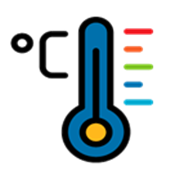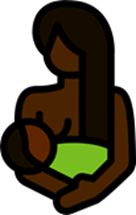When babies are born they cannot regulate their own temperature, so it's really important that parents and carers are able to do this for them.
To keep your baby warm during birth, your midwife will; 
When your baby has been born, your midwife will;
Whilst it is important to keep your baby warm, it is possible for them to overheat. Please speak a healthcare professional if your baby feels cool or hot to the touch.
In The Hospital
As parents, you are vital members of the team in ensuring your baby is kept warm. There are many things you can do to help:
Let the midwife or care provider if the birth room is not warm enough. This is very important just before and in the hours after the birth. If adults (in short sleeves) are feeling that the temperature in the room is becoming too warm, then it is just the right temperature for your newborn baby.
 Remind the staff to close windows and turn off the air conditioning/fans or turn up the heaters.
Remind the staff to close windows and turn off the air conditioning/fans or turn up the heaters.You can check your baby’s temperature by feeling the back of the neck or the chest. They should feel slightly warm to touch, although hands and feet can sometimes feel a little cooler.
When You Get Home
Small babies are not very good at controlling their own temperature. Once you are home ensure the room temperature is between 16-20 degrees Celsius. Any more than this and your baby can be at risk of overheating. You can purchase room thermometers from your local pharmacy or online.
How will I know if my baby is too hot or too cold?
Your baby may wake up during the night, which can be a sign that they are not at a comfortable temperature. If the back of their neck or their tummy feels nicely warm then they are fine. If their skin feels damp they may be too hot.
Do not worry if their arms, hands or feet feel cool. This is quite normal and helps them to maintain a regular temperature.
It is not recommended to put a hat or hood on your baby whilst they sleep as this can cause them to overheat.
Bedding
The easiest and safest type of bedding to use is a baby sleeping bag. These are now widely available and come in different thicknesses depending on the temperature in the baby's room.
A baby sleeping bag is a wearable blanket that will keep your baby at a comfortable temperature through the night. You will not need a duvet or blanket and your baby’s head will remain safely uncovered. Blankets can also be used, but it is easier for a baby to kick them off or get tangled in them.
The tog rating or weight of a baby sleeping bag determines its thickness and how warm it is. The higher the tog rating, the warmer the sleeping bag.
It is likely you will need a couple of bags; a standard 2.5 tog and a lightweight one for warmer weather. Although you can buy different togs, you will need to adjust the clothing your baby wears underneath. In very hot weather, they might just need to wear a nappy or short-sleeved bodysuit, whilst in colder weather, a bodysuit and sleepsuit may be needed.
Taking Your Baby's Temperature
A normal temperature in babies and children is about 36.4C, but this can vary slightly. A high temperature or fever is usually considered to be a temperature of 38C or above.
Your baby may have a high temperature if they:
If you think your baby has a high temperature, it's best to check with a thermometer. This can help you work out whether you need to get medical advice.
Safer Sleep
Sleep is a really important for your baby’s growth and development. It takes a while to understand a new baby's sleep pattern and this is different for all babies. Establishing sleep patterns in the first few months will help your baby settle and self soothe.
Getting into sleep routines can be difficult when you have a new baby or are tired yourself. Sometimes the easiest options about where and how your baby falls asleep can put them at risk.
With the rising cost of energy bills you may find it difficult to afford to heat your home during the winter. Below are some services that can help support you and help lower the amount you have to pay.
The warm home discount scheme might be able to get £140 off your electricity bill or a £140 voucher for your prepayment meter. You can get this under the Warm Home Discount Scheme if you’re either:
Find out more about the warm home discount scheme
Cold Weather Payments are one-off payments to help you pay for extra heating costs when it’s very cold. You’ll get a payment each time the temperature drops below a specific temperature for a set period of time.
You’ll only be eligible for a Cold Weather Payment if you already get:
If you feel worried and would like more advice you can speak to your midwife throughout your pregnancy and up to 28 days after the birth of your baby.
If you live in Norfolk
If you live in Suffolk